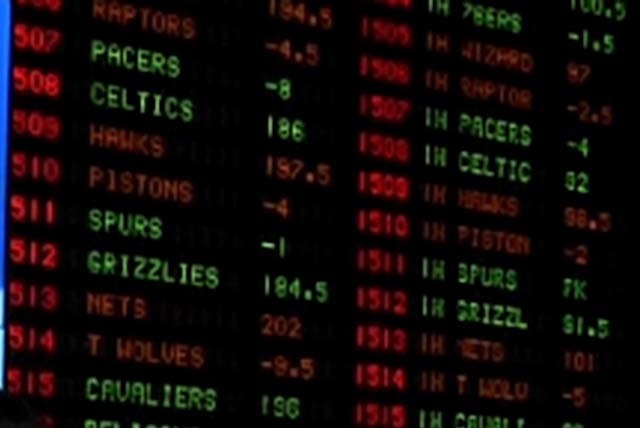Super Bowl heightens debate on legalizing sports wagering

Imagine for a moment that Las Vegas-style sports wagering was legal in other states.
Maybe the NFL’s negative attitude toward betting would be relaxed.
That way, Strip casinos could advertise their Sunday events as Super Bowl parties, rather than hiding behind the term “Big Game,” out of fear of trademark lawsuits by NFL attorneys.
The hoopla and festivities surrounding the 49th Super Bowl wouldn’t be any more heightened.
Wagering aside, Sunday’s game between the defending champion Seattle Seahawks and the New England Patriots sells itself.
Controversy around New England’s underinflated footballs, the silence of Seahawk Marshawn Lynch versus teammate Richard Sherman’s constant motor mouth, and the “love him or hate him” attitude regarding Patriots coach Bill Belichick make the game a must-watch for football fans and nonfans alike.
In Nevada — especially on the Strip — gambling enhances the action.
Last year’s Super Bowl was a milestone, according the Gaming Control Board. Sports books won $19.7 million from a record $119.4 million wagered on the Seahawks’ 43-8 win over the Denver Broncos.
Sports book operators are quietly saying this year’s matchup could top last year’s betting handle.
The teams and the location — the game will be played in Phoenix — all factor into Las Vegas’ benefit.
Sports betting is at all-time high in Nevada. In November, gamblers wagered a single-month record $535 million on sports, which included a record $400.7 million on college and professional football.
When December and year-end numbers are released Friday, additional records could be set.
Technology advancements, such as mobile sports wagering applications and in-game betting, help fuel interest in the activity. For the Super Bowl, the hundreds of proposition wagers offered by Nevada sports books enhance the attraction.
The debate over legalizing sports wagering outside of Nevada has grown, thanks to two moments last year.
National Basketball Association Commissioner Adam Silver in November wrote in a New York Times Op-Ed piece that expanded sports wagering in the United States should be legalized and regulated. He became the first CEO of a major sports league to advocate for the change.
“Sports betting should be brought out of the underground and into the sunlight,” Silver wrote.
Meanwhile, New Jersey has been fighting since 2012 to legalize sports wagering at the state’s casinos and racetracks as a way to prop up the Garden State’s sagging gaming industry. A federal judge blocked the state’s proposed law in November and supporters hope an appellate court will take up the issue this year.
The Washington-based American Gaming Association wants its members to choose the best course to take on legalized sports wagering.
Last week, in a speech at the U.S. Conference of Mayors meeting in Washington, association CEO Geoff Freeman said an estimated $3.8 billion would be illegally wagered on the Super Bowl, 38 times more than will be bet legally in Nevada.
Illegal bookies don’t report earnings to the Internal Revenue Service, so the association estimated the total using various public numbers and figures concerning legal and illegal gambling.
But Freeman’s message to the mayors was clear: Bring gambling — particularly sports gambling — out of the shadows and into the open, where it can be properly regulated.
The 1992 Professional and Amateur Sports Protection Act, known as PASPA, banned sports wagering except in Nevada, Delaware, Oregon and Montana. The other three states offer only small stakes betting through parlay cards or a lottery.
Two New Jersey congressmen — Frank LoBiondo, a Republican whose district includes Atlantic City, and Democrat Frank Pallone — introduced legislation last week that would exempt the the state from PASPA.
Rep. Dina Titus, D-Nev., whose district includes the Strip, said the bills will deflate faster than a Patriots’ football. She is often approached by other representatives about gaming matters.
“Based on these conversations, there appears to be little appetite for any expansion of sports betting at this time,” Titus said. “I will continue to watch the bills, however, and discuss their potential implications with leaders of the Nevada gaming community.”
Nevada’s independent sports book operators, William Hill US and CG Technology, obviously support any expansion of legal sports wagering. The company’s leaders believe regulated sports wagering would provide jobs and revenue for states.
It would also help ensure game integrity and protect customers. The best example remains the 1994 Arizona State basketball point-shaving scandal that was uncovered and reported to law enforcement by Nevada sports books.
William Hill CEO Joe Asher said he doesn’t believe legal sports wagering in California would hurt Nevada.
“Las Vegas is much more than get your bet on,” Asher said. “You can bet on the Super Bowl today in California, illegally. We know people are doing that.”
Howard Stutz’s Inside Gaming column appears Wednesdays and Sundays. He can be reached at hstutz@reviewjournal.com or 702-477-3871. Follow on Twitter: @howardstutz.












